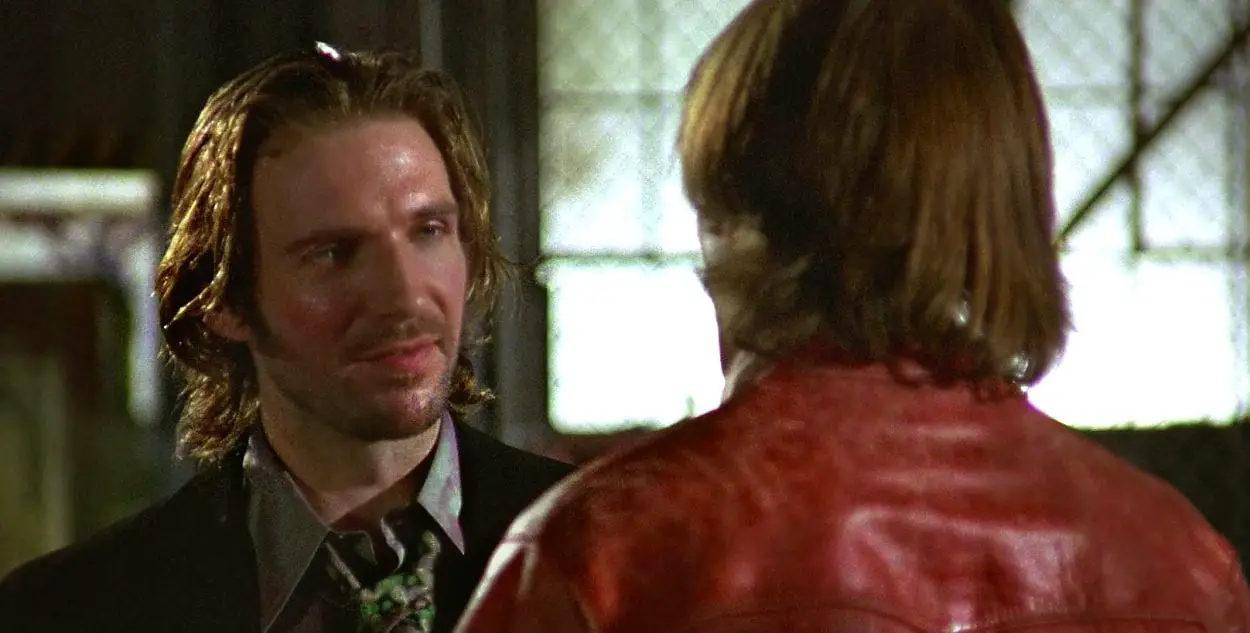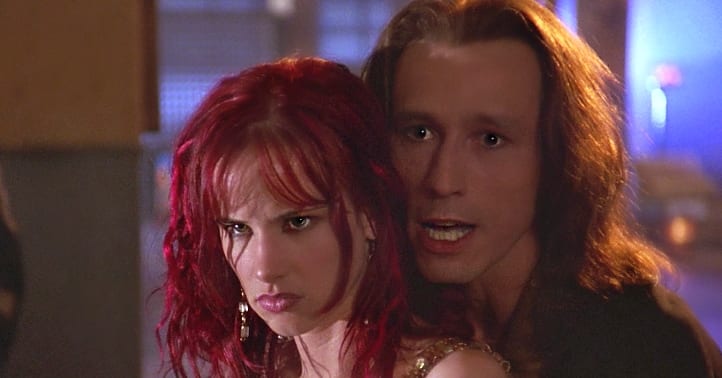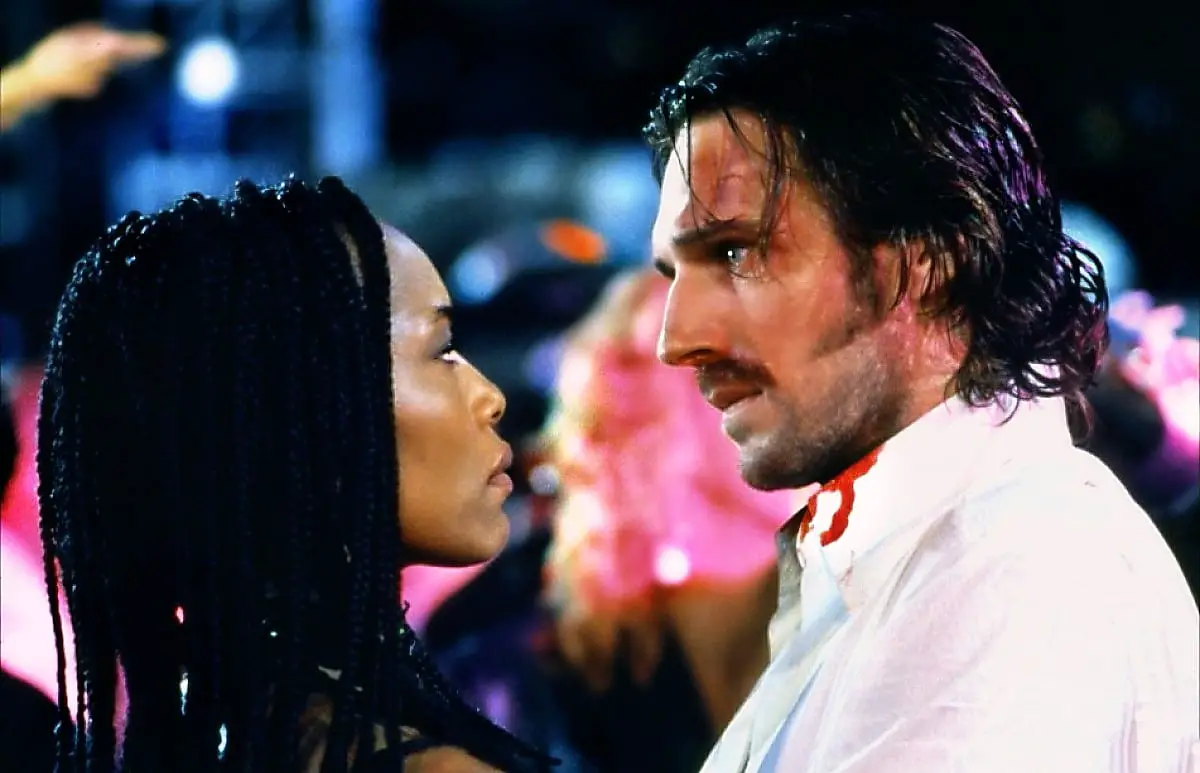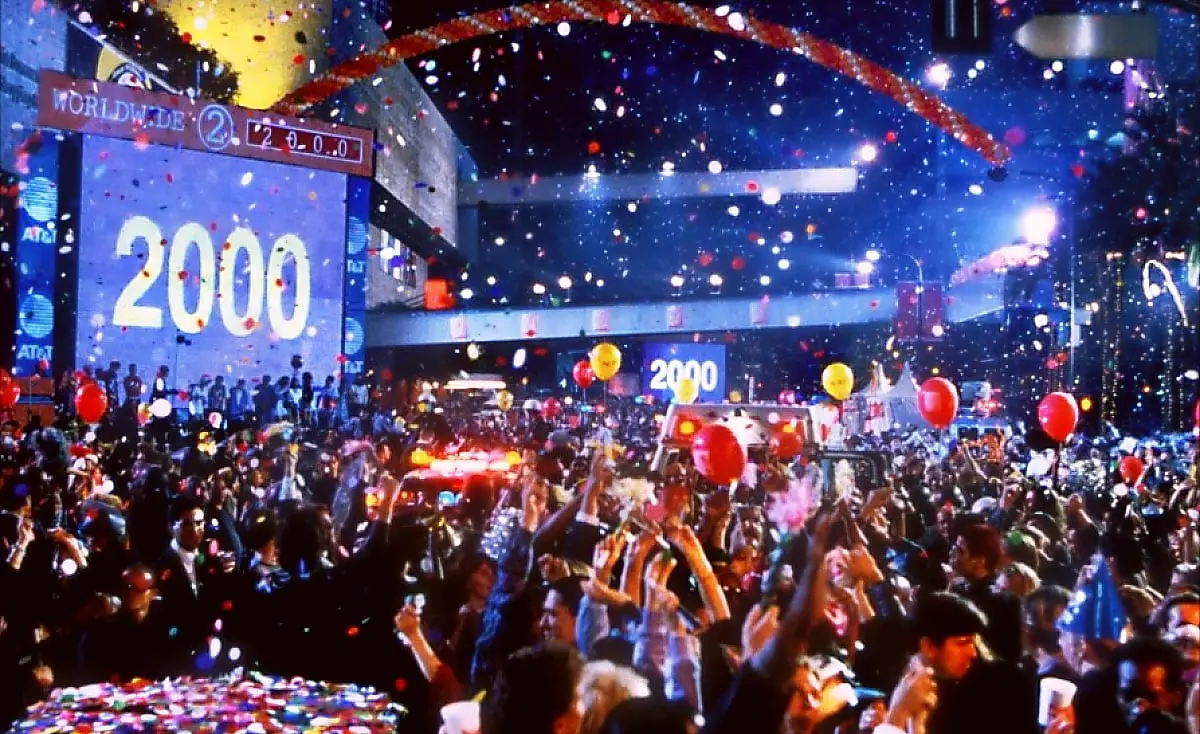While much of the world were logging on to the internet for the first time during the second half of 1995, Hollywood saw the importance of this new technology which could take us away from our daily lives as a means of escape and its view was not an optimistic one. Movies such as The Net, Hackers and Kathryn Bigelow’s Strange Days depicted a society reliant on plugging in and escaping the real world. In the case of Bigelow’s extraordinary film, there was no escaping the real world, and that was the message which would dominate the movie’s story, characters and themes
Strange Days was filmed during the summer and fall of 1994 in Los Angeles when the area was gripped with fear after the mutilated bodies of Nicole Brown Simpson and Ron Goldman were discovered one evening. The movie (which could almost be called Strange Nights seeing that the movie was filmed during 77 nights which included a new year’s celebration requiring 10,000 extras) was filmed a year before the internet went mainstream but after the LA Riots, Lorena Bobbitt and during O.J. The only other movie to benefit from timing like that was Natural Born Killers which coincidentally, was appearing in theaters while Strange Days was filming. Something was happening in the air and Bigelow’s kinetic film captured every bit of it.
In Strange Days, Ralph Feinnes is Lenny Nero, and if Fiennes was looking for a role shake to shake off his Amon Goeth from Schindler’s List or his egghead character from Quiz Show, then he couldn’t have chosen better. Lenny was once a respectable Los Angeles police officer who now makes a living dealing in SQUID recordings — discs recorded from memories and physical sensations directly from the wearer’s cerebral cortex. Today we call this technology Virtual Reality and it is easy to find in games, movies, and in our phone apps such as Instagram and Snapchat which allows us to use filters or to enhance who we are. Lenny promises his buyers that what they’re buying is not TV. It’s a piece of somebody’s life. An experience captured by the mind and the eye during the subject’s most intense experience of their lives.
Lenny no longer wears his officer blues. His uniform now consists mainly of tight leather pants (the kind Val Kilmer slinked around in for the duration of The Doors), a gaudy satin grey/purple unbuttoned shirt that looks like something out of Carlito’s Way, while sporting long greasy hair that looks styled after Brad Pitt’s stoner Floyd from True Romance. Lenny’s new uniform fits the line of work he’s in—peddling SQUID discs to customers in seedy all-night Los Angeles bars dives.
Lenny takes on the role of a car salesman in his midnight consultations, and he’s very good at selling his product. He assures his marks that he’s selling an experience unlike anything they have had. If it can be imagined, Lenny can provide it: If a buyer wishes to experience the adrenaline high of robbing a restaurant while being pursued by a team of trigger-happy cops inside a building he can provide it to them. One of his most popular vids (among middle-aged men in particular) recreates the sensation of an 18-year-old female taking a shower. As seedy as this all is, Lenny does have rules he adheres to; he doesn’t deal in “blackjack”, meaning anything depicting murder, death or vicious harm to others. Robbery is fine, sex is fine, but anything outside of those areas is not his thing.

Lenny has become the go-to guy to buying quality SQUID discs and with a distributor partner Tick, (Richard Edson of Do The Right Thing), Lenny tries to remain out of the eyesight of his former L.A.P.D. acquaintances. Lenny’s most trusted friend is a private detective named Max (a terrifically game Tom Sizemore in his most Tom Sizemore-est role since Natural Born Killers.)
Lenny, taking a cue from Scarface’s Tony Montana, occasionally dips into his stash of SQUID vids. Seeing as how he’s a former L.A.P.D. officer there probably isn’t much he hasn’t experienced firsthand when it comes to excitement and danger so those types of clips don’t do it for him. Lenny’s clips are more personal and intimate. Lenny “jacks in” to discs of the time he spent with his former girlfriend and lover, Faith (’90s staple Juliette Lewis). The main vids he watches over and over again show the couple outside, roller-skating along the beach. Faith laughs, flirts and gazes with affection towards Lenny underneath warm, bright sunlight (the only sunlight we see in the entire movie), and we sense Lenny feels tremendous love and happiness when he’s with her. The other video Lenny watches depicts him making love to Fath in bed from his point of view. It seems Faith did not mind Lenny wearing one of those spider-looking SQUID headsets during their lovemaking. Kinky.
The scenes of a lonely Lenny viewing his Faith discs are not that different from the scenes in Steven Spielberg’s Minority Report (released seven years after Strange Days). That movie’s main character John Anderton (Tom Cruise), spends his evenings sadly watching digital videos of his long-missing son, now believed to be dead. It’s quite striking the similarities between these two characters in these two futuristic sci-fi, action, mystery movies. Despite all the fancy tech at their disposal and in their worlds, all they really want is to feel again a connection with a human being they once cared very much for.
In the Spielberg movie, we learn Anderton doesn’t have anybody to call a friend but Lenny for all his faults does. Lenny’s other confidant is Lornette “Mace” Mason (an outstanding Angela Bassett), a limo driver trying to keep herself out of trouble for the sake of her son who she’s trying to raise in a city that seems just one hair away from exploding in anarchy. Mace doesn’t approve of Lenny’s line of work or his “associates”, but she carries a tinge of affection and even love for him due to how Lenny took care of her son back when he was a trustworthy member of the police force. Mace dutifully drives Lenny from one “meeting” to the other and picks him up from whichever curb he’s lying on whenever he gets punched or thrown out of a bar for illegally peddling SQUID vids. Mace gives him a hard time and disapproving look during these drives and Lenny charms his way into her limo night after night but her patience with him and the “work” he does is running out.
Mace has no love either for Faith who she blames for the downward spiral Lenny found himself experiencing when she left to pursue a singing career. Faith is now living with big-shot music mogul Philo Gant (a marvelous as always Michael Wincott, fresh from his scene-stabbing work in The Crow) in some spacious loft that’s always blasting alt/rock 24/7. Wincott, with his long black raven’s hair and his teeth grinding snarls, is a beaut to watch and it seems he’s using his Robin Hood: Prince of Thieves accent once again for this movie. I love seeing this guy onscreen and he never disappoints. One also wonders if Philo might be based on a movie executive or two Bigelow has had to deal with during her career, but if he was, she’s never admitted it.

Another one of Lenny’s friends is Iris (Brigitte Bako), a beautiful, young sex-worker who plays a major piece in this movie’s story-line. Iris has a SQUID vid that will put the L.A.P.D. in a very bad light should the public ever see it. When we first see Iris, she is being chased relentlessly by two LAPD officers, Steckler and Engelman (played by the always terrific to see actors Vincent D’Onofrio and William Fichtner). Steckler, in particular, runs after Iris as if he’s the T-1000 from Terminator 2: Judgement Day. Whatever Iris has it’s certainly important. Iris is carrying a video of the two officers gunning down prominent rapper Jeriko One (Glenn Plummer), a popular hip-artist who wrote and released some very non-flattering tracks towards the L.A.P.D.
Here Bigelow drew upon the hip-hop group N.W.A and how one of that group’s young members, Ice Cube wrote the incendiary anti-L.A.P.D. track “F*ck Tha Police” In 1988. In the late ’80s and early ’90s, much was made of “gangsta rap” and the way it painted law enforcement negatively in its lyrics. In 1985 a young Dr Dre produced one of the earliest anti-police tracks with Toddy Tee’s “Batterram.” During the late ’80s, then U.S President Ronald Reagan appointed L.A.P.D. chief Daryl Gates to oversee the “war on drugs” in his community, namely South Central, Los Angeles. During this time, the LA hip-hop scene was rising in this section of LA and so were tensions between the police and these rappers.
Bigelow also drew on one of the country’s most excessive and famous instances of police brutality. On March 2, 1991, construction worker Rodney King was driving home from watching basketball at a friend’s house. He was spotted speeding on the 210 Freeway by two officers in a police car. Backup was called due to King’s refusal to stop. Once he did, King was ambushed by four L.A.P.D. officers who believed he was high on PCP. King was struck with batons on the side of his face and was dealt fifty-six blows to his body before the officers finally stopped and dragged him off to the hospital. A nearby neighbor recorded nine full minutes of the ordeal on his VHS camcorder. That footage was sold to a local news outlet for $500 who passed it to the L.A.P.D. (today it would be posted to YouTube). The incident stirred wide public outrage and a year later when the officers were acquitted, it was the catalyst for the 1992 LA riots. The reason I mention it here in this review of Strange Days is because of how affected Bigelow was by these incidents in particular.
Another note: Strange Days was released 11 months before the murder of rapper Tupac Shakur in Las Vegas on September 7, 1996. After Shakur’s death, there was much criticism leveled at the Los Angeles Police Department regarding their investigation into the incident. In this movie, Jeriko is certainly a Tupac like-figure: he had legions of adoring fans from recognizing social injustice (especially when it came to police brutality), and we learn Jeriko delivered that message in his music. I don’t believe anyone is suggesting the L.A.P.D. played a role in Shakur’s death but Bigelow perhaps felt someone such as Jeriko/Shakur and their words were too big and powerful not to have gone unnoticed.
Although the Strange Days screenplay is credited to James Cameron (who conceived of the idea back in 1986) and Jay Cocks, the movie is fully Bigelow’s. In one interview Bigelow gave around the time of the movie’s release she said of the ’92 riots in particular, “I was involved in the downtown cleanup, and I was very moved by that experience. You got a palpable sense of the anger and frustration and economic disparity in which we live.”
Bigelow drew upon the King verdict for the Jeriko One story-line of Strange Days and the two officers depicted in her movie represent the King attackers; quick to act and unnecessarily brutal. It’s no wonder Iris wishes to escape from them so she runs (literally) to the one person who she can trust with her clip: Lenny.
With Lenny now in possession of the Jeriko murder clip he convinces Mace to watch it, above her objections. Once she does, she realizes the fallout that could occur if the video gets out. Strange Days takes place in 1999 (the final two days of the year in fact), but no mention is made of the real-life ’92 riots. We do know that in the movie Jeriko’s music did incite anti-L.A.P.D. protests. We also learn that Jeriko was managed by Philo and here Lenny sees a chance to get Faith away from Philo’s grasp. He’ll exchange the disc for her. Except Mace wants the disc handed over to LA deputy police commissioner Palmer Strickland (Josef Sommer), the same commissioner who booted Lenny from the force. While Lenny just wants Faith back, Mace wants to preempt a disastrous and possibly quite tragic race war.
As we can see, Bigelow is exploring big topics in this seemingly sci-fi hacker movie; racism, power, abuse and of course, voyeurism and Strange Days is not the first one to explore that topic. Psycho, Peeping Tom, Rear Window and Dressed to Kill have all dealt with the topic before and one can always argue that just the practice of watching movies is in itself an act of voyeurism. Bigelow drives this home as well. At one point in Strange Days, Lenny comes into possession of one of those snuff films he tries as best as he can to stay away from. What makes this particular nasty bit of video all the more upsetting is that it depicts Iris as the victim of a brutal, shocking and disturbing sexual assault and her murder which is shown from the point of view of the person committing the act.
It is a tough scene to watch—especially in 2020 when sexual assaults and its long-lasting effects on victims have been dominating the social discourse for the past three years. We’ve all felt our hearts break for every person who has chosen to speak out about their ordeal. Maybe we can take some small comfort in the fact that Iris’s attack is fictional and directed by Bigelow who we know wasn’t ever going to put one of her performers in harm’s way. Lenny (and Max) react in sickening horror to the Iris clip, and if there’s a moment where Lenny realizes this business might finally be too much for him, it’s this.
However, Iris’s killer is still out there and probably doing this to other women. If Strange Days does have a weak spot, it’s in the revelation of Iris’s assaulter. I’m reminded of the 1989 thriller Sea of Love right now and both movies do have similarities; they are mainly night movies, murders are happening, everyone is a suspect and desire controls everybody and the killers are revealed (a little too neatly) in the end. Both are movies with style and battered-around characters, and regardless of who the killers are, society still stinks.

Audiences did not warm to Strange Days when it was released in October of 1995. The powerhouse trailer made it look like True Lies and Speed combined, yet the movie was a major box-office bust earning only $8 million of its hefty $48 million budget (today this movie would cost triple that). As this article makes clear, there is a lot of plot within Strange Days, and as this article also makes clear, a lot of uncomfortable themes are explored throughout. Fans of James Cameron were probably hoping for trucks chasing dirt bikes along the freeway or Arnold Schwarzenegger hanging from a helicopter above the ocean 2000 feet in the air, neither of which Strange Days offered.
The cast is dynamic all the way through, and Fiennes carries the movie wonderfully. His Lenny is charismatic, desperate, lean and frightened throughout. It must have been odd for this newly-minted leading man who in 1993 spent months freezing in Krakow filming Schindler’s List with its minimal core cast and then a year later, prowling the nighttime streets of sticky warm Greater Los Angeles with more than 10,000 people screaming around him for Strange Days. No wonder he headed to the quiet desert to film The English Patient after this.
Bassett exhibits a sharp face, sharp eyes and an even sharper mind in her role as Mace. She’s as tough as they come and her heart is only melted by her son and against her will, for Lenny. Bassett plays Mace as a steely protector against the crookedness surrounding her. She was so good in this role she’s now playing a similar character on the hit NBC series 9-11. Tom Sizemore made any role watchable in the ’90s and if you read his autobiography, you know he and his co-star Juliette Lewis were involved in a tawdry relationship during this time. They don’t share as much screen time here as they did in Natural Born Killers and again if you read his autobiography you’d know that was probably for the best.
The real star of Strange Days, however, is Bigelow and her visionary mind. Just take a look at this movie’s opening five-minute sequence depicting a Chinese restaurant robbery shown from the point of view of the robber as he wields his gun, runs through the kitchen, up stairways, onto a roof and jumps to the next one, where ultimately, the viewer falls to their death. It’s one of those “how did they do that?” movie sequences that stay with you for a long time. Kudos to cinematography Matthew F. Leonetti (Poltergeist, Dead Again) for his skill in pulling off Bigelow’s daring, inventive sequences. Her movie is full of big themes, and it’s also full of big chases, big explosions, big near-death misses and a big, big end of the decade party at the end.

Today in 2020, virtual reality is not a scary, other-worldly, brain-seizing concept. It’s in our everyday lives. Society doesn’t need a Lenny Nero to help us “jack in”, we don’t have to meet greasy-haired hucksters in dingy bars at midnight to obtain our VR fix. We have Best Buy outlets where we can purchase consoles and headsets together for under $200 at any time of the day and bring them home to place under the Christmas tree. We and our families can golf, ride a roller-coaster, ski down a mountain, walk the desert sands of Tatooine from Star Wars or drive a race car all from our living rooms while wearing our slippers. It’s a different world today for sure.
The SQUID vids Lenny sells would probably be rendered obsolete now with an internet infested with unlimited types of pornography. Where every sexual fetish imaginable is available to view on the phones we carry around with us wherever we go (but we shouldn’t do that in public. Even in this vulgar time we find ourselves living in). SQUID vids have become Instagram feeds where the most beautiful of us post photos at exotic locales and ten thousand followers “like” a person’s photo within an hour. For example, a guy no longer needs a “clip” to experience what it would be like to have over a dozen gorgeous women worship them and grovel at his feet as if he’s the only man on Earth—we have The Bachelor for that. One wonders what Lenny Nero would make of it all? He seemed to know that it was the future, but even he probably didn’t realize there’d be a day we would no longer have to hide our dirty desires. They’d be out there in the open, and there’d be no escaping it. That’s where we are now and without any doubt, we are all truly living in strange days.



Hello im 35 years old and black i saw it when i was a kid when it first came out. Looking at it now we are really in the dark days. The race war will never stop. Perfect time for this movie.
Well-written, excellent analysis of a generally under-appreciated film.